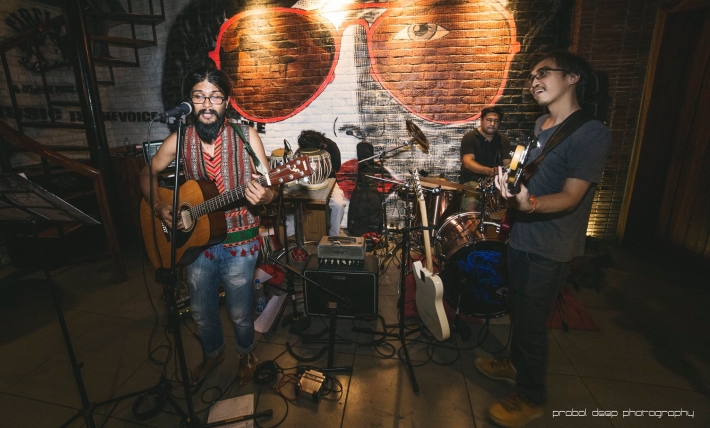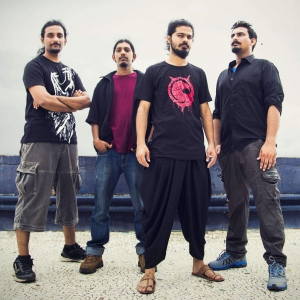
 Photo Courtesy: Dhon Rongpi
Photo Courtesy: Dhon Rongpi
What do you think of when you hear the term 'folk music'? A couple of men sitting around in a village under a tree in traditional outfits singing in [insert incomprehensible regional language] accompanied with basic Indian instruments such as a dhol or an obscure local string instrument? OR do you think of Irish musicians in an isolated bar singing in harmonics, dancing in skirts? Or garba? or baul musicians? Or women in Rajasthan around a bonfire singing and dancing to 'Rajasthani folk tunes'?
Depending on where one grew up, people seem to have different imageries and musicians associated with the concept of folk music. In India particularly, there are as many rich bodies of folk tunes as there are regional languages, a lot of them having been used and depicted in Indian films or re-worked by musicians outside of films. It becomes a little difficult then to accurately define a particular kind of music as 'folk', especially when they are common songs by known writers, except by a certain 'feel' that this music is more comfortably 'folky' than any other genre, because of the way it sounds and our mind best likes it being associated with folk (accurate or otherwise). A simple example would be – any Rajasthani song written even recently is automatically put under the 'folk music' mental category.
This confusion about the genre is evident even in Ojapali’s description of their music. When asked to describe their latest music, their guitar player Dhon Rongpi tells us - it’s “folk music primarily, with a hint of hindustani classical and we are working on some stuff that sounds pop rock-ish as well, all within a clean, airy aesthetic.” However, he adds that, "Technically, our music is not necessarily folk in the sense that all the songs have been written by actual song writers in Assam somewhere around the 1920s or 30s or say Rabrinath Tagore songs in Bengali, whereas, by definition folk music is usually music written by unknown authors which has been passed on through generations – mostly orally."
Intrigued, we got talking to Dhon about their beginnings as musicians, childhood associations with folk music, the new video, and their plans for the upcoming EP.
Could you tell us a bit about your band members?
We have Bhargava on the vocals and guitars, Bivas on percussion duty and backing vocals and myself on guitars and backing vocals
How did each of you get into making music?
I started off with guitar lessons as a teenager, and later decided to study audio engineering and music production. There, I met Bhargava whose foray into music started at a young age being surrounded by traditional and folk music in Assam. Bivas is a trained tabla player and also trained in Hindustani classical vocals.
Is this band a full-time project for all of you or do you also have other jobs?
I run Strobe Studios, a recording studio with Bhargava - who is also into live sound. Bivas is a music teacher.
How did you get together and decide on this music?
Bhargava and I are both sound engineers and we met at SACAC (Sri Aurobindo Centre for Arts and Communication, Delhi) during our course and thought of forming a band. After we got together and jammed, we took these songs and started making loops and figuring out the arrangements on the computer by giving them a different treatment.
Is the music you make open to collaborations?
Yes, we believe so. There are a lot of relatively unheard folk singers and instrumentalists who are really unique at what they do and collaborations would definitely be exciting and challenging.
When you say ‘relatively unheard folk musicians’, it seems like there is a folk community and environment that regular listeners of independent music might not be connected to. Could you tell us a bit about this?
Yes, I understand that. I’m from Assam but was born and brought up in Delhi and had no idea about this music. Bhargava however, was raised in Barpeta, Assam, and grew up in a musically inclined family with an emphasis on traditional music. He recollects an environment where people in his village would gather and sing these songs often. So, it does come more naturally to him. There are still a lot of local folk songs that most people haven’t heard.
Do you have a specific audience in mind for your music?
Anyone willing to lend their ears to folk music. There’s no target audience in mind. Most of it is pretty cheerful music and should be easy for people to relate to.
It is a general notion that folk music is restricted to smaller towns. How do you think you can reach out to urban audiences?
We do want to write songs in such a way that it is more accessible to people in cosmopolitans - this is definitely at the back of our minds, albeit keeping the essence of the original intact.
We believe Evil Soul Media (ESM) Productions have made your latest video 'Hiyar Maje'. How did you get in touch with them and what was your brief to them for the video?
The guys behind ESM Productions are Bhargava’s roommates. They make music videos for bands - the most popular one being for Girish and The Chronicles I believe. Basically, we are a folk band so we thought the hills would be a good background for the video and a fresh aesthetic would fit the theme within our limited budget.
What are you currently working on?
We are currently in the studio, jamming and working on our first EP tentatively titled ‘Sonor Din’. We have already completed a couple of songs. It will mostly consist of Assamese songs although we also are planning on including a few songs in Hindi, which should help reach out to a wider audience.
Can you tell us a bit about the artwork for the upcoming EP?
We have not decided on something yet, but ESM is probably going to do that for us as well.
What are your plans for going live with the music?
Given the kind of music we make, I would see us playing at a big gathering or music festivals. As for pub shows, in Delhi we mostly find sufi rock or cover bands playing (laughs) - not sure how we will feature in that scene. In seriousness though, we are gearing up for our EP launch later this year.
If you had to list a few musicians as your influences, who would you name?
We can’t really think of specific influences for these Assamese songs that we’re making. However, there’s this band called Tinariwen from Mali we recently stumbled upon and really like. Especially with this EP, we did try and understand how they worked on their music, although the essence of our music remained the same. In our songs you’ll find that there is almost a dialogue ensuing between the vocalist and the guitars and other melodic instruments while the groove is sort of static and repetitive.
(We checked out Tinariwen's music and could not stop watching video after video of their live performances on YouTube, including one where they play with Red Hot Chilli Peppers. Find links below.)
Do you have any creative patterns, routines or rituals that you follow?
There are of course no fixed ways, but our creative process usually starts with the three of us sitting together and jamming to a lokageet or Bhargava and I sitting in front of a computer just recording guitars and vocals.
What are you favourite places for inspiration?
Recording studio, coffee shops, a vacation!
What quote would you say best describes you and your music?
I think going by the sounds of our forthcoming EP - 'Minimal eastern folk music'.
Could you share the best advice you were offered creatively?
To play by instinct.
Your band name Ojapali, what does it mean?
Ojapali is a traditional form of singing in Assam.
(We looked it up and found that Ojapali is also a traditional folk dance, being one of the oldest art forms in Assam. It has a narration based singing and dancing format with dramatic actions and dialogues.)
Watch Ojapali's new music video for 'Hiyar Maje' below -
Tinariwen are joined onstage by Flea and Josh Klinghoffer of the Red Hot Chili Peppers during their performance at The El Rey in Los Angeles.
Nischay Parekh has quickly garnered a large fanbase following the release of his debut record, Ocean, an optimistic and pleasant collection of delightful pop tunes driven forth by a perceptive aesthetic of melody, dynamics, and progression. We caught up with the singer, multi-instrumentalist, and composer for a short chat about his songwriting, the process of setting up a tent in his room during recording, and current and future plans.
Mumbai’s Hindi progressive outfit Coshish have released their debut album, titled Firdous, with Universal Music India.
Susmit Sen, guitarist and founder member of Indian Ocean has decided it is time to let go of the reins of what has been a phenomenal journey with a band...





Leave a comment